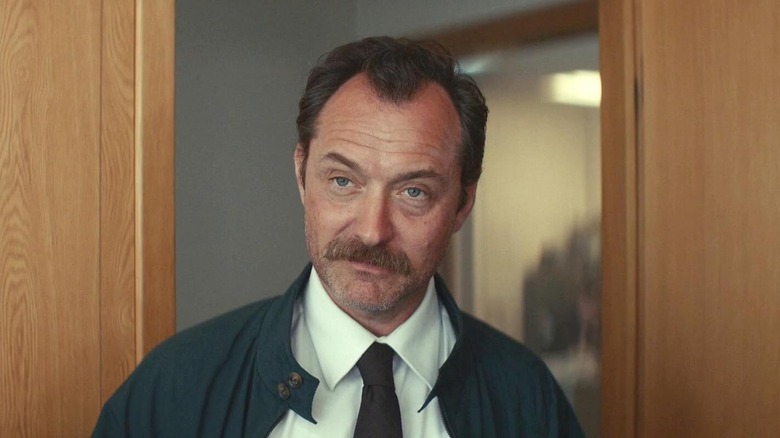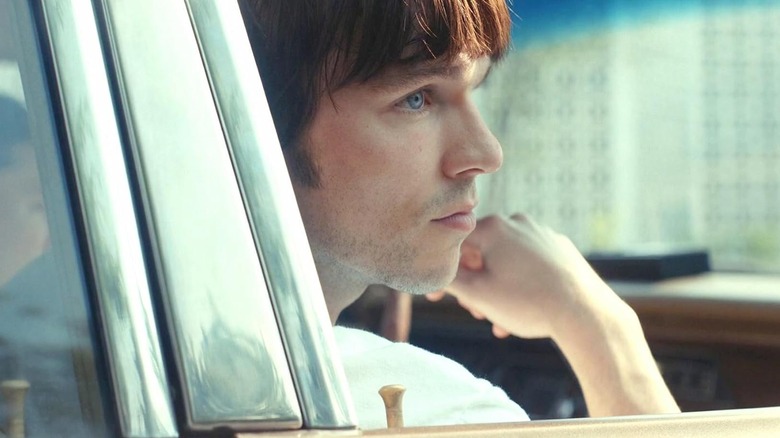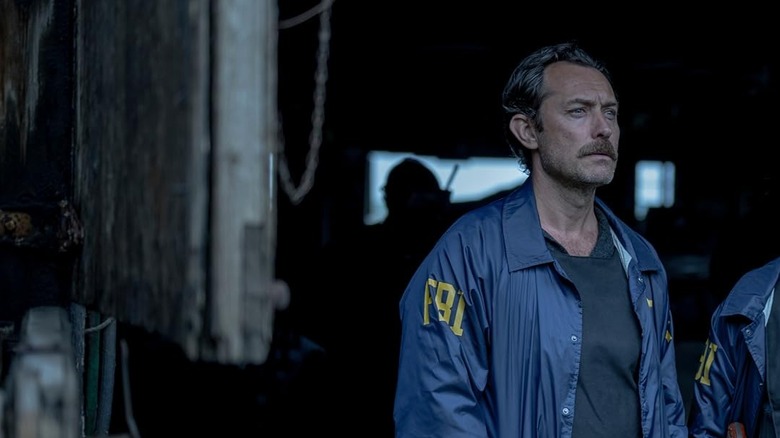The Terrifying True Story Behind Jude Law's Crime Thriller The Order
One of the most chilling scenes in Justin Kurzel's "The Order" (a movie that's found a larger audience thanks to streaming) takes place at the National Alliance convention. There, Bob Mathews (Nicholas Hoult), the leader of the neo-Nazi terrorist group The Order (aka Silent Brotherhood), delivers a speech to recruit soldiers. The room he stands in is covered with giant swastikas and blood-red and freedom-blue American flags, and its air is heavy with hate and testosterone. Mathews knows his crowd. He pleads with the desperation and anger of these people, saying, "If you're like me, I'm not sure how much more talk I can hear. Cause that's all it is, isn't it? Talk, talk ... talk!" No action, no real results. He knows all the pressure points of the mind of a white supremacist to keep on pushing until empty words of hatred turn into vile actions of racism and violence. He's promising a future where his brothers and sisters stand tall and united after purifying the entire nation under their regime.
The scene hits hard for two reasons: Firstly, Hoult has slowly become the master of his craft as an actor who can command an audience with his enticing charisma and potent gravitas on either side of the screen. And secondly, the majority of the film's plot is based on a (sadly) very true story that occurred in the early 1980s. Bob Mathews and his Brotherhood did, in fact, exist, and they represented the most abhorrent and damaging belief of white nationalism that can only bring ruin, chaos, and bloodbath to a country — and to the world.
Establishing The Order and spreading the word to create an all-white America
Kurzel's film is based on Kevin Flynn and Gary Gerhardt's non-fiction book, "The Silent Brotherhood: The Chilling Inside Story of America's Violent, Anti-Government Militia Movement." According to it, The Order was founded in September 1983 by Robert Jay Mathews in Metaline, Washington. He was a Texas-born American of Scottish descent who developed his extremist views quite early on. The neo-Nazi organization depicted in the film wasn't his first. He had also founded an anti-communist militia before, known as the Sons of Liberty, which was mostly made up of Mormon fundamentalists and survivalists.
Mathews and his Aryan followers (some of which were war veterans with military experience) primarily drew inspiration for their anti-government and antisemitic ideology from the 1978 novel "The Turner Diaries," which was written by William Luther Pierce — the founder of the National Alliance where Mathews and his comrades were regular attendees. Essentially, the book had six steps (recruiting, fundraising, armed revolution, domestic terror, assassination, and the Day of the Rope) to overthrow the government and declare a war to purify America (by exterminating Jewish and non-white people) and create the ultimate white nation.
Although Mathews claimed he drew little inspiration from the book, it was evident he treated Pierce's words like a bible to White Nationalists. (He read from it to his son as a bedtime story and reportedly kept dozens of copies at his militia's headquarters.) And just like terrorists that came after him (including Oklahoma City bomber Timothy McVeigh and Norwegian mass murderer Anders Behring Breivik), he used the material as a blueprint for his malicious plans.
While active, the Order set up camps in Idaho and Missouri to train their new recruits by using U.S. Army manuals and stockpile weapons and surveillance equipment. After a few failed efforts to raise funds legally, Mathews decided to counterfeit cash and distribute the bills to other white power groups in order to strengthen his growing militia. That alone wasn't enough, however, so he began to rob pornography stores, armored cars, and eventually banks that he deemed as establishments associated with or controlled by Jewish people. He did anything to justify his crimes to his followers in order to accomplish his grand ideas.
The turning points that led Mathews and his people to ruin and death
Once Mathews started robbing armored vehicles and banks and acquiring large sums of money (over $4 million), The Order gained the attention of the FBI (the primary viewpoint from which the events unfold in the movie). But the real turning point — eventually leading to the group's downfall in December 1984 — came when Mathews ordered the assassination of the famous radio talk show host Alan Berg. As played by Marc Maron in the movie, Berg was Jewish and well-known for his candid and often controversial views on religion and liberal politics, which repeatedly angered Mathews and his people. Once an Order member even called in the show and went on a tangent, sharing a conspiracy theory about how Jewish people were plotting to take over the world. But the group's deep-seated hatred truly escalated toward him in June 1984, at which point two of The Order's men (David Lane and Bruce Pierce) killed the Denver radio host in the driveway of his home. Berg was shot dead by Pierce, who fired 13 bullets into the 50-year-old's body.
After the murder, Mathews' organization gained worldwide publicity, and a special FBI team was ordered to stop the group. As seen in Kurzel's film (which painstakingly adapted most of the real-life events in its story), The Order came to an end when Mathews was raided in a rented waterfront house on Whidbey Island and — after a two-hour shootout involving machine guns, tear gas, and a helicopter — died when the building exploded. Just weeks before his demise, Mathews had an arrest warrant on him for killing an FBI agent.
The authorities learned the whereabouts of Mathews because one of his acolytes (Tom Martinez) had become an FBI informant months earlier and gave up his leader as he started to spiral out of control.
Though The Order had a brief functioning period in the 1980s, unfortunately, its heinous acts and toxic ideologies of right-wing extremism didn't die with Mathews and still influence extreme views today. As the author Kevin Flynn put it in a Wired interview, "We didn't write the book for the details. We wrote it to expose the banality of evil, so readers could understand where these folks come from and how endemic it is in American society."


